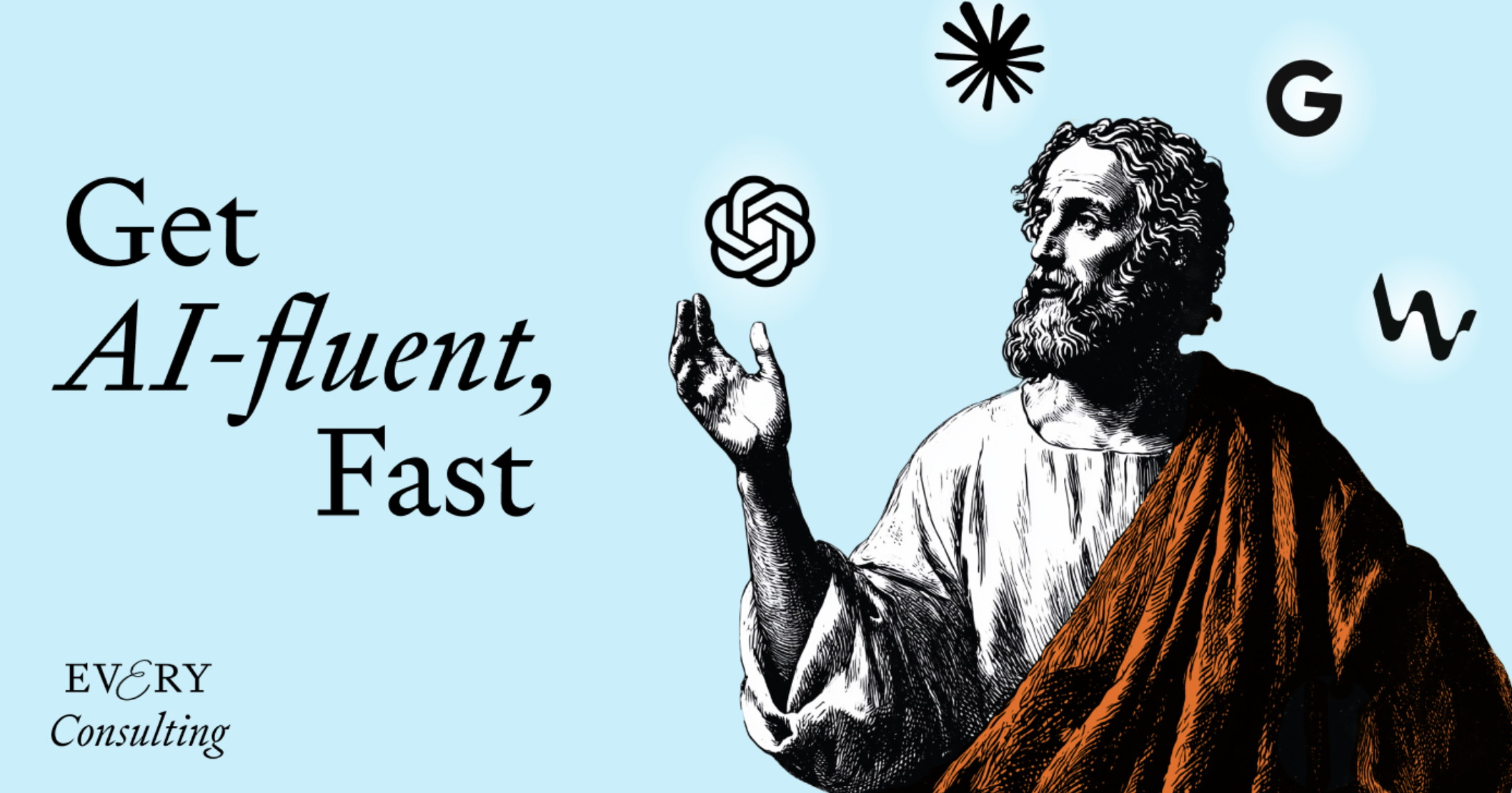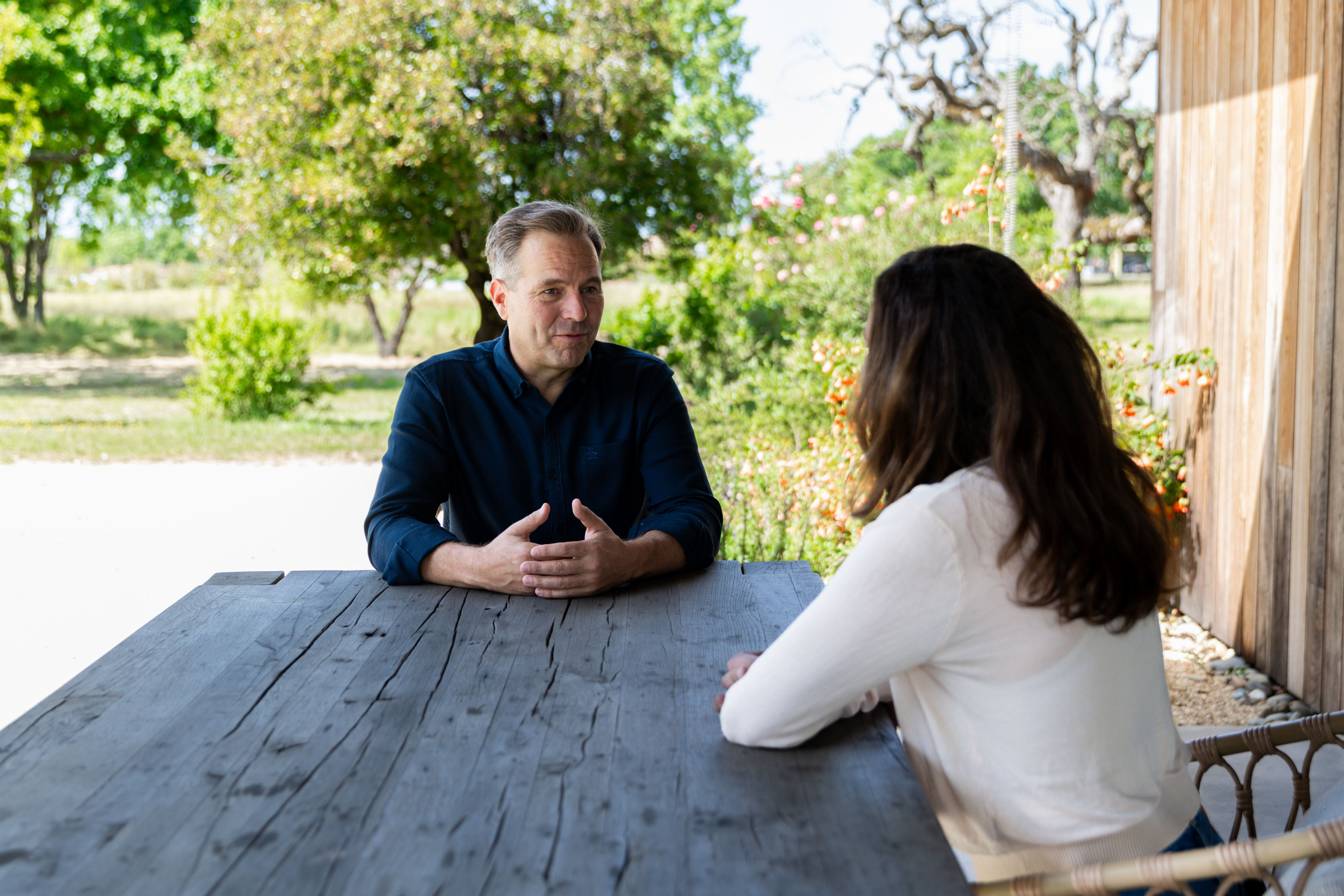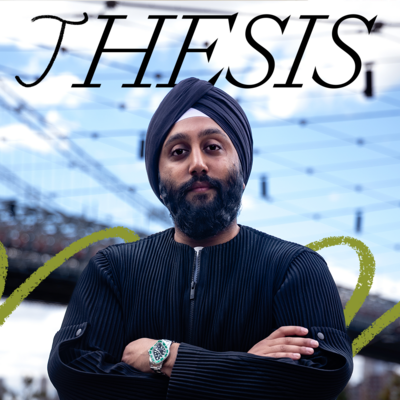.png)
Joe Hudson works with the executives building AGI at OpenAI—many of whom believe AI will soon do the jobs they're currently doing. But they're not panicking. They're developing entirely different skills that will remain valuable, with Joe’s help. I've known him personally for a few years, and not only is he a sharp thinker, he's also remarkably grounded—someone who faces the uncertainty of the future not with anxiety but with genuine curiosity, compassion, and practical wisdom. In this piece, Joe offers something rare and valuable: a clear-eyed, deeply human path forward that will leave you feeling more capable, not less. (Stay tuned for his upcoming appearance on our podcast AI & I.)—Dan Shipper
Was this newsletter forwarded to you? Sign up to get it in your inbox.
Before AI, knowledge set you apart. Knowing more meant earning more. Accumulating skills, developing expertise, and mastering frameworks got you ahead.
Today, as models swallow entire fields overnight, wisdom—skills like emotional clarity, discernment, and connection—is what keeps you indispensable. As CEO of Microsoft, Satya Nadella made it a priority to instill these capacities throughout his organization. In eight years, the company’s market capitalization climbed from $300 billion to $3 trillion.
I work with the people building artificial general intelligence itself—including OpenAI CEO Sam Altman, the company’s cofounder Wojciech Zaremba, its research and compute teams, and senior executives at Google’s DeepMind, Anthropic, and Apple—and they’re racing to master the same three inner skills. Many of them seek me out because they understand a sobering truth: They are building the technology that will make their own skills obsolete. In the not-too-distant future, AGI will be able to do what they can do today—faster, cheaper, and at scale.
My job is to help these leaders develop their abilities in areas that AI cannot replicate. I help them lead not from fear, ego, or having something to prove, but from a deeper place of wisdom.
Here’s why—and how you can, too.
If 90%+ of your team isn’t using AI everyday, you’re already behind
You’re not going to get good at AI by nodding through another slide deck. Every Consulting helps teams level up—fast. We’ve trained private equity firms, leading hedge funds, and Fortune 500 companies. Now it’s your turn. Customized training. Hand-held development. A rollout strategy your team will actually use. Let’s make your organization AI-native before your competitors do.
Knowledge work is dying—welcome to the age of wisdom work
AI models don’t sleep or burn out; they can absorb entire fields of study in days. One highly trained model will soon be able to outperform an expert in physics, law, and engineering—simultaneously, at any hour. Facts, skills, and expertise will be increasingly commoditized, and even the smartest of us will be replaceable.
It’s easy to overlook how radical that is. Our entire society is built around knowledge as a scarce, precious resource. School systems, standardized tests, Ivy League pipelines, job interviews, LinkedIn profiles are all mechanisms to measure, prove, and reward how much you know. Hence the rise of over 1 billion knowledge workers: professionals valued for what they knew and could do, like lawyers, engineers, consultants, and programmers.
Now, imagine a world where all that is irrelevant, akin to the ability to build a fire today—occasionally useful, but mostly unnecessary in a world with light bulbs, central heating, and stove tops.
We all know the person who gets a free pass because they’re good at something—the developer who ships flawless code but shreds morale, the investment banker who triples deal flow but hijacks meetings, and so on.
For decades, extraordinary knowledge or skill created a protective moat around bad behavior; people muttered, “That’s just how they are,” and kept the peace. But when a model can draft the brief, diagnose the anomaly, or optimize the market strategy in seconds—and do it politely—why keep paying the emotional tax of a brilliant jerk?
But you don’t have to be a talented blowhard for your skills to be at risk of AI disruption. The leverage has shifted from what you can do to how you show up while doing it. Competence is now table stakes.
And when knowledge is no longer scarce, what remains valuable? Wisdom. You can get answers from AI, but how you use those answers takes wisdom.
Wisdom is how to live. It is the residue of mistakes, metabolized by time and reflection. It can’t be rushed, and it can’t be copy-pasted. It is an embodied—as in felt in the body—experience, guidance from the inside.
No matter how intelligent AI becomes, it can’t live your life for you. It can’t feel your body’s signal in a high-stakes negotiation, sense the hidden fear in a boardroom, or hear the unspoken "no" behind a client's polite words.
That’s why tomorrow’s economy will prize wisdom workers. Let’s dive into their three core skills: emotional clarity, discernment, and connection.
Emotional clarity: Learn how to take your emotions seriously, not literally
Most people think emotional work is about becoming more “regulated” or less reactive. Two of the main strategies I see today are:
- Emotional repression. We numb, distract, stay busy, avoid certain topics, or intellectualize. We tell ourselves we’ve “moved on” or “let go” when, in fact, we’ve buried something alive inside of us.
- Emotional management. The well-meaning attempt to “handle” feelings. We try to breathe through them, exorcise them by writing in a journal, reframe them, or meditate until they pass.
These techniques can be helpful. But when we use them to bypass what's real, they turn into avoidance.
Whether repressed or managed, avoided emotions don’t go away. They return in a pattern I call the “golden algorithm.” It goes like this:
- Name an unwanted emotion in your life.
- List the ways you try to avoid it.
- Notice that every way you try to avoid it, you actually create it.
For example: I don’t want to feel like a failure —> I play it safe —> I feel like a failure. (Drop this prompt into the AI model of your choice to find your own golden algorithms.)
With emotional clarity, on the other hand, you take your emotions seriously, but not literally.
It is the ability to recognize your emotions, feel them, and move forward unobstructed—the difference between being caught in the storm and becoming the sky that holds it. Surveys show that this kind of emotional intelligence is already the number-one criteria for managers when considering a team member for a promotion or salary increase.
Obsessing over pros and cons lists? Finding yourself in a recurring pattern? Ruminating at night about how to avoid a company setback? These aren’t thinking problems; they’re feeling problems. In fact, studies show that when the emotional center of your brain is impaired, your IQ stays the same, but it takes hours to make a simple decision—like where to eat or what pen color to choose. Neurologically speaking—and contrary to popular belief—we don’t make logical decisions. We make emotional ones. And emotional avoidance clouds our decision-making.
Psychologists echo this: Chronic procrastination shows up less as a time-management failure and more as an emotional struggle—we delay to dodge anxiety, self-doubt, or fear of failure.
I’ve seen this firsthand: Some of the most brilliant founders, executives, and creative professionals I’ve worked with weren’t stuck because they lacked intelligence or strategy. They were stuck because they didn’t know how to deal with their emotions.
They avoided discomfort or bypassed fear. And they made reactive choices—ones that felt smart in the moment but cost them deeply in the long run. Sometimes it meant burning out their team or walking away from an opportunity too soon, and other times it meant chasing the wrong metric for years.
Companies are increasingly adopting AI into their workflows—Moderna just plugged more than 3,000 custom GPT agents into every corner of the company, for example. As models handle more and more tasks of execution, people’s jobs will be more focused on decision-making, and emotional clarity will be even more valued than it is today.
Indeed, the two building blocks of a company are (1) decisions and (2) relationships. Emotional clarity underpins both of these. It’s why people like Altman hire me, because they see emotional clarity as “[o]ne of the most critical skills in a post-AGI world.”
Promotions in the age of wisdom won’t go to the people with the most impeccable spreadsheet, but to those who can transform a team’s silent anxiety into aligned action.
Discernment: You can’t see the world clearly if you can’t see yourself clearly
In the knowledge-work era, we often assumed the person with the best dashboard or most comprehensive analytics was the smartest one in the room.
But we are drowning in dashboards and real-time feeds, and evidence suggests that piling on more data often hurts decision quality:
- Too much choice stalls action. In the famous "jam study," shoppers presented with 24 flavors bought jam 3 percent of the time, while those offered just six flavors purchased 30 percent of the time—a 10-fold jump.
- Information overload erodes well-being. Two-thirds of managers report that constant data flow lowers job satisfaction, and one-third believes it harms their health.
- Analysis paralysis kills action. Research by Deloitte in 2024 showed data overload is the number-one source of “analysis paralysis” in the C-suite.
Discernment goes beyond what is true in the stacks of data. It is the ability to see things clearly and zero in on what matters.
What most people don’t realize is that your relationship with yourself sets the tone for everything else. If you don’t trust yourself, you won’t trust your team. If you shut down your own desires, you’ll feel resentful of others’ wants. If you’re judging other people, you’ll judge yourself even more.
In short, if you can’t see yourself clearly, you can’t see the world clearly. And your discernment is compromised.
I’ve worked closely with some of the most accomplished people in the world—people leading multi-billion-dollar companies, building cutting-edge AI tools, or running high-stakes creative teams. The biggest barrier to their growth is almost always the way they relate to themselves when things get hard—or even when they are great.
I once coached a founder who had just raised a major round of funding. On the outside, everything looked great. Inside, he was in a constant war with himself. Every decision was second-guessed. Every meeting left him replaying what he should’ve said. He couldn’t rest, celebrate, or feel the success. The voice in his head kept repeating, “This isn’t enough. Why aren’t you doing more?”
This sort of negative self-talk can become so familiar that it becomes invisible. But our nervous system can feel the attack, and your body lives in a state of chronic fight-or-flight. From that state, it’s nearly impossible to access creativity, intimacy, or wise decision-making.
The way to address this is not with more productivity hacks or discipline. I’ve found it far more effective to learn how to befriend yourself and speak to yourself with the same respect you want from others.
Indeed, changing how you relate to yourself is one of the foundations of my work with clients. Here’s an experiment you can try: For 20 minutes every day for a week, listen to the critical voice in your head*.
- Every time it is mean, say “ouch.”
- Every time it tells you that you messed up, say “ouch.”
- Every time it tries to make you feel small, say “ouch.”
- Every time it tells you you can’t do something that other people can do, say “ouch.”
- Every time it nags you to do something, say “ouch.”
*Make sure you say “ouch” out loud.
People are often stunned by how often they end up saying “ouch”—a visceral reminder of just how relentless that inner critic can be. Naming the sting in real time interrupts the automatic shame-loop and turns passive self-judgment into something you can see, hear, and choose to soften. Bringing your relationship with yourself into light will help you uncover blind spots, see your limiting beliefs, and illuminate your false assumptions—all of which increase your discernment.
Connection: Vulnerability, impartiality, empathy, and wonder
The majority of us have been taught that connection is earned through achievement. We believe that once we become successful, smart, or generous enough, we’ll be worthy of connection.
But people don’t want you to be perfect. They want to be connected to you.
This doesn’t mean charisma in the traditional sense; instead, it’s deep relational presence—the ability to attune to others, see and be seen, and create safety even when pressure is high.
The foundation of my coaching is built on connection. I teach it through a framework called VIEW: Vulnerability, Impartiality, Empathy, and Wonder.
With VIEW, we access connection not by trying harder, but by removing what is getting in the way of the connection that is always here. I’ve used this framework everywhere from Fortune 500 boardroom discussions to marriages on the brink of divorce. It’s one of the most reliable ways I know to create transformation—not through force, but through presence.
When you stop performing and start relating from a place of vulnerability and openness, people can feel you. And that feeling is what builds trust, safety, and deep connection.
This skill will matter more than ever when knowing things is no longer primary to being effective. Studies show that teams whose members feel safe to speak up learn faster and hit their targets more often. Google’s Project Aristotle, which set out to understand what made teams successful, found that of all variables studied, psychological safety was the number-one predictor of high-performing teams.
While people do grow attached to chatbots and develop bonds that soothe loneliness, these connections are fundamentally parasocial and transactional: The flow of care moves in one direction; AI has no skin in the game. Deep connection demands mutual, embodied relational presence—nervous systems coregulating through micro-expressions, tone shifts, and even subtle changes in breathing. AI can model supportive language, but it cannot feel surprise when you walk into the room, nor does its pulse quicken when you share bad news.
The Harvard Study of Adult Development—the world’s longest-running longitudinal study, tracking people since 1938—found that the single strongest predictor of both happiness and physical health in old age was the warmth of participants’ close relationships. In fact, quality of connection at age 50 predicted health at 80 better than cholesterol levels did.
No matter how powerful AI becomes, if you want to feel fulfilled, you’ll still need to be deeply connected with other humans. If you want to change the world, you’ll need to be deeply connected with other humans. If you want to be a part of a high-performing team, you’ll need to be deeply connected with other humans.
The rise of wisdom work: The gap will only grow
AI may one day solve the grand unifying theory, cure all disease, and figure out how to protect us from starvation. What it can’t do is tell you how to be when fear, doubt, or the existential nausea of “Now what?” occurs.
How you answer these questions will set you apart: What do I want and how do I own it? What kind of leader do I want to be? What’s the most effective thing for me to be doing at this moment? What does “effective” even mean to me?
These are not problems of knowledge or information. They are a matter of wisdom.
It’s clear to many that we’re already stepping into the age of wisdom work. Every CEO Dan Shipper points to the rise of the allocation economy, where the advent of AI means everyone will become a manager: “You won’t be judged on how much you know, but instead on how well you can allocate and manage the resources to get work done.” Being a great manager requires all three of the skills I’ve described.
Some of the most well-resourced founders and executives in the world are investing in these three areas. That’s not a phenomenon of just my personal clients—people across the business world are prioritizing wisdom more and more. Nadella’s focus on rebuilding Microsoft around an empathy mindset, emphasizing emotional intelligence and self-reflection, has led to a 10-fold jump in the company’s valuation, record engagement scores, and top-quartile (88 percent) CEO approval. Google’s Search Inside Yourself program teaches mindfulness, emotional intelligence, and empathy to engineers. It has provided measurable changes in lower stress, higher engagement, and faster innovation—and is now licensed to executive teams at companies around the world.
Inner work isn’t just a personal growth tool anymore. It’s a strategic imperative.
Joe Hudson is the founder of the Art of Accomplishment and one of the most sought-after coaches among Silicon Valley’s top leaders. You can follow him on X at @FU_joehudson and on LinkedIn.
Thanks to Melody Song, head copywriter at the Art of Accomplishment, for her editorial support. You can follow her on X at @melodaysong.
To read more essays like this, subscribe to Every, and follow us on X at @every and on LinkedIn.
We build AI tools for readers like you. Automate repeat writing with Spiral. Organize files automatically with Sparkle. Deliver yourself from email with Cora.
We also do AI training, adoption, and innovation for companies. Work with us to bring AI into your organization.
Get paid for sharing Every with your friends. Join our referral program.
The Only Subscription
You Need to
Stay at the
Edge of AI
The essential toolkit for those shaping the future
"This might be the best value you
can get from an AI subscription."
- Jay S.
Join 100,000+ leaders, builders, and innovators

Email address
Already have an account? Sign in
What is included in a subscription?
Daily insights from AI pioneers + early access to powerful AI tools










.png)


Comments
Don't have an account? Sign up!
Not once has anyone said to me, "thank you for telling me everything you know about what's bothering me", but I can't tell you how many times people have thanked me for understanding them.
Thanks to Melody and the crew. That was a refreshing story. No idea who Joe Hudson is and this is why we like Every. If he wrote all of that, then he's an accomplished communicator, too.
Disagree completely with this. This feels like a sales pitch with a completely flawed premise. HITL will continue to be important if only for one simple reason: accountability and liability. Only humans can be held accountable and liable in knowledge work. AI cannot. Secondly, AI knowledge cannot equal practitioner knowledge because they're two different kinds of knowledge. One is based on automated explicit knowledge, the other is tacit, experiential knowledge that is based on agency. They work best together than otherwise. A
This entire pitch will only lead to disappointment and disillusionment amongst executives in the long run. If the aim is to upsell AI, it'll work but that's about it. The future will belong to AI architects and HMI practitioners who will seek to better integrate and augment human workers with AI.
One of the first articles I've seen that clearly paints a picture of the future and give practical guidance on how to get there. Studies also show that the biggest leverage a company has is to invest to make leadership better. Whatever way I look at what you are saying, it not only resonates but ties into everything else I know about the topic.
A good case for Yoga and Vedānta. Eastern traditions, including ancient Indic philosophies have built systems for inner work that have stood the test of time: emotional clarity, discernment, and connection. I wrote a book, YOGAI: Interplays of Yoga and Artificial Intelligence that can be a good primer. https://a.co/d/btwrgKJ
Loved the concept of "VIEW." Also, I was thinking the same thing as written here, human skills will be more important than ever in the AI era. Let me re-read this article in the future.
Absolutely brilliant! To me, this view of the how to be a successful human in an AI world makes more sense than anything else I have read. I see remarkably slow adoption overall to AI in business and personal pursuits, and reaching a critical mass of "wisdom" as outlined here could be a generation away. With the speed of how AI is doing knowledge work, it will be interesting to see how this unfolds.
totally agree wisdom is the next attainment...interesting when talking about emotions you only focus on the negatives....when i teach i focus on the posiitve.....hope. love and tools like music humor to get there with connectivity.....the one company I started and went to 44 million in revenue know what the biggest connector was for employees, clients and suppliers? our in house rock band...that's great wisdom and the songs we created about our busienss! I also think until we get to feel emotions there will never be a singularity..and llm's don't do it...watch out for neuro-symbolic AI making llm's obsolute....and anyone talking about what quantum computing is going to do to all this? One should
Ultimately, it's impossible to enter fully into this conversation without considering some version of the spiritual dimension, if one is the define "spirituality" as simply the inquiring into your essential nature. This is essential nature is the source of true wisdom. Trusted advisors of the future will help their clients to create the experience of this wisdom directly.
AI will not replace the work force. The workforce with AI skills will replace the workforce without AI skills